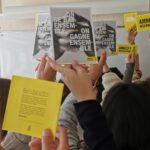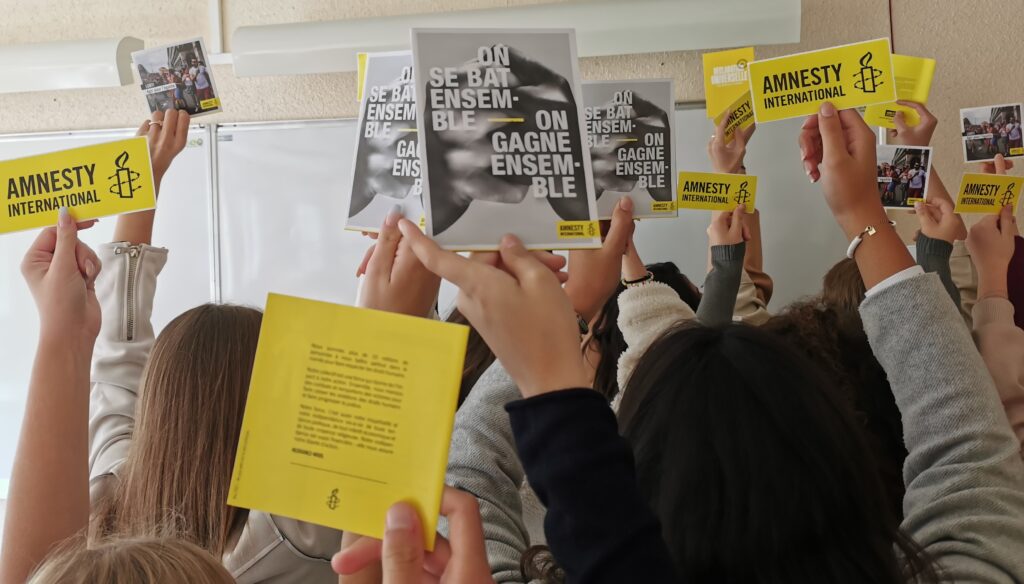Diversité et Inclusion

Dans le cadre de l’étude du thème « Diversité et Inclusion », les élèves de Terminale, anglais obligatoire, et le groupe « Jardin de la Paix » ont assisté à une conférence de M Delorme, membre d’Amnesty International, sur les Droits Humains.
Les Droits Humains, la Déclaration des Droits de l’Homme ainsi que les droits internationaux des LGBTQ ont été expliqués aux élèves du point de vue de la législation. Cette conférence était l’aboutissement de l’étude de l’axe Diversité et Inclusion du programme d’anglais.
Les élèves du groupe Jardin de la Paix et de Terminale 904/5 ont tous écrit un compte-rendu de cette intervention en anglais, travaillant ainsi la compétence écrite. ( A consulter ci-dessous, après la photographie)

Clara LAVAUD — 905
Jardin de la paix
» On 18 October 2021 we attended an Amnesty International conference led by a speaker. First of all, what is Amnesty International, it is a movement of 10 million people who fight for human rights and whose slogan is « we fight together, we win together ». Their main belief is that when human rights are at stake, every fight deserves a victory and their main mission is to fight relentlessly until human rights are respected everywhere and their strength is to win every fight through the strength of the collective.
Amnesty International wants to fight, together, to win one victory after another. This organisation values solidarity, independence and impartiality. They fight for refugees and migrants in order to protect people who are forced to leave their countries, sometimes brutally, is an obligation; freedom of expression because without it no one can claim their rights; the death penalty and torture; arms control; but also armed conflicts and populations; they also fight for sexual and reproductive rights and discrimination.
First of all, the speaker explained some important points in the history of human rights. First of all, we used to say « human rights », now we prefer to say « human rights », which is a more inclusive adjective that includes women, children, etc.
The conference took place in three main movements, firstly, a part on « EDH », then we talked about « AI », then about « UDHR ».
The spokesperson explained that human rights education (HRE) is a right in itself, and like research, advocacy, campaigning, communication or fundraising, it is also one of the priorities of Amnesty International. HRE aims to raise awareness, sensitise and clarify the concept of human rights through reflection, questioning and action. It is a voluntary activity that helps to cultivate critical thinking in citizens of all ages. HRE affects schools and mass education circles. But most importantly, it affects each of us at all stages of life. It is a huge lever for everyone to take action against human rights violations.
Particular focus is paid to the subject of AI research, contracting researchers such as the CNRS, among others, to study and analyse situations, such as the waves of migration in Menton, for example.
Also on advocacy, on the death penalty for example, discourse on how to impose a point of view on the theme of human rights.
But also, on demonstrations: in 2017 in Menton, « I welcome » (always on migration with the aim of raising awareness).
We then talked about what is behind the acronym « AI » which is Amnesty International. Created in 1961 with more than 7 million people to ensure that the rights set out in the UDHR are respected, to make petitions, to intervene in embassies if there are any in France? Amnesty International is an international non-governmental organisation, which is apolitical and aims to promote the protection of human rights and the respect of the Universal Declaration of Human Rights. The organisation campaigns specifically for the release of prisoners of conscience, the right to freedom of expression, the abolition of the death penalty and torture, and an end to political crime, while respecting all civil, political, economic, social and cultural rights.
And finally we talked about the « UDHR », the Universal Declaration of Human Rights which was adopted in Paris at the Palais de Chaillot by the United Nations on 10 December 1948, the Universal Declaration of Human Rights (UDHR) is defined in its preamble as « a common standard of achievement for all peoples and all nations ».
The Universal Declaration of Human Rights (UDHR) is a founding text and essential to the fight for human rights.
Adopted in 1948 by the very young United Nations, the text represents a major advance in the history of humanity. Out of 56 countries, 48 voted in favour, 8 did not, namely the USSR, South Africa and Sudan. This text represents an unprecedented consensus to define, characterize and frame the rights inherent to every human being.
For an organization mobilized in the defense of human rights like Amnesty International, this text is fundamental and essential. The Universal Declaration of Human Rights is at the heart of their mandate and mission.
2018 marks the 70th anniversary of the adoption of the UDHR in Paris, at the Palais de Chaillot. This is an opportunity to recall their attachment to this text and to contribute to making it better known. »


